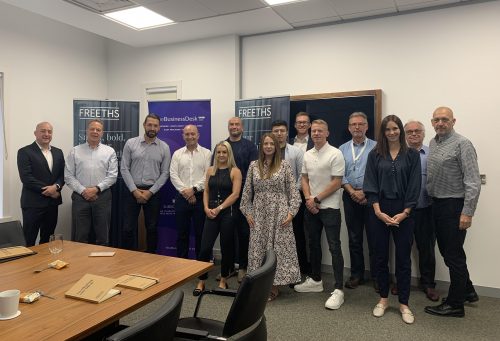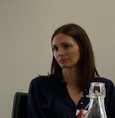Building a workplace culture in the hybrid age


In order to better understand the dynamics of workplace life, TheBusinessDesk.com worked with law firm Freeths to host a thought leadership round table with key decision makers in businesses from around the North West.
We wanted to understand how a workplace can build a culture of learning and collaboration, but not just with office workers, but teams who work in labs, warehouses and factories, customer facing teams for whom hybrid may not be an option.
The results were fascinating. We touched on three main areas: Creating a positive work culture – away from and within the office; mental health – how to support employees and recognise those in need; recruitment and retention – how do you manage the current and future talent pool?
These edited highlights provide a useful snapshot of a remarkably honest and candid discussion.

Laura Tracey
Laura Tracey, employment partner at Freeths outlined her experiences through clients of the firm:
“Hybrid working has been great for certain individuals, for certain employees in certain businesses. Typically a lot of women have welcomed it and it has been great because women still take the majority of the childcare and it’s allowed more flexibility. It’s less stigmatised now that both men and women work from home.”
But, she said, there have been an increase in disputes as a result of hybrid working. Possibly because of the geographical distance between managers and workforce. “Managers don’t always know how to manage hybrid workforces. And so people are either being left out of conversations, or performance isn’t being managed, or it is managed, but it’s not managed in the right sorts of ways. And performance management is really, really difficult when you’re all disparate, and how are you measuring outputs, when you’re not kind of physically all sat around together?”

Steph Whittaker
It led to a discussion about managing culture in the hybrid environment. Steph Whittaker, head of talent and people at FourNet, highlighted the ranges of character types many businesses have, such as introverts and extroverts and how some scenarios don’t suit everyone.
“Culture is really difficult to embed in people when they’re not physically there, it’s been a good challenge to think differently about how we engage people and encourage inclusiveness and collaboration.”
Cameron Lee, head of strategy at fintech company Total Processing, agreed: “During lockdown you had to hire remotely, and build hybrid into the workforce. In the post-pandemic environment we’ve had to get the best people to actually perform better as a business, find the people who want to come to the office, but we also have software developers who don’t want to, and frankly, the labour market is really tight, they could go and work for any other tech business and work from home.”
Richard Bertram, business development director at workplace design business TSK, said: “One of the biggest challenges we’re seeing at the moment is with businesses who trusted everybody to go home during the pandemic and work from home, now people are saying we don’t trust you. And the ones that were failing are the ones who are just mandating their people to come back to the office. You’ve got to magnetise people back in, give them a reason.”
Donald Moore, chair, One + All agreed, and explained how it’s given him an opportunity to shift the culture even further and support people at work, part of his development of a profitable but inclusive school uniform business that is now employee owned. “We’ve had like seven people resign in seven years. We’ve grown, but the talent that we attract, some may be paid less than they would anywhere else, but we support people and offer flexibility on the important things in their lives, like a school sports day, or the dentist and stuff. It makes such a difference.”
John Allaway, managing director of Faith in Nature, a sustainable natural beauty products business, told the story of how his company achieved B Corp status, like One + All, but also how he made some important decisions in pursuit of a strong culture: “When I joined the business, pretty much everyone was based at home. I had two options, carrot and stick. Make the rule, I’m the new MD so come back to work.” Or, he said, create a better culture to attract people.
“So we took a really ground breaking decision, we opened up an office within Manchester city centre to try and attract good sales and marketing people. We were in Radcliffe. We bit the bullet, opened up an office with a pool table, murals on the wall, plants around the place, but most importantly, we gave people flexibility.”

Neil Muttock
Neil Muttock, commercial director of telecoms business Evolve, said their business integrated two businesses. “”Moving into a new office space and integrating acquisitions drove us to adopt a new way of thinking and approach to our culture and we knew the time was right to begin delineating it on paper. We’ve made a concerted effort to simplify our internal messaging so that everyone feels valued and instead of imposing new values and cultures, we’ve simply improved our ability to capture what was always there. We now have three simple, easy-to-understand values that define our organisation and guide our daily actions.”
Jason McKnight, a director of RECOM solutions, a construction project management consultancy, offered some insights from his business: “Our retention is really good at the moment. A positive culture means you have to understand that there’s no such thing as work life, it’s all life. And if you got to take your dog into the office suite, if you got to drive your kids to school or nursery school, then as long as you’re focused on your targets and deadlines for clients, that’s fine. And that has been working quite well for us.”

Richard Wallace
Richard Wallace, chief executive of LCM Environmental solutions illicited a lot of agreement when he said every business is different and he sees teams distributed all over the country and appreciates the pressures hybrid workers are in, sometimes young people living with their parents or in shared houses with mates. “I get my hybrid workers in every two weeks, and they all come into the office and we talk about what’s going on making sure everybody’s content, but it’s a challenge,” he said.
Nick Thornhill, managing director of Bedspace, also spoke of the different cultures in teams he runs, and was very candid about his own pressures of leading a team of people who themselves work with often very vulnerable people, and the need for the team to find a way of self-expression at work.
“One of our offices is one of those environments where it just puts a smile on your face when you walk into the office. But then some other people may perceive that to be not professional, right? But because of the work they do, I’m fine with it,” he offered.
Also very candid was David Field, tax director, employee solutions at accountancy firm RSM, who was honest about his deeply personal experiences during lockdown: “During Covid I was clinically extremely vulnerable. I suffered massively. I was telling clients how they could change their workforce and change their policies and make it all encompassing, which made it worse. I was sat at my desk in my spare room and and felt totally isolated in my mental health. It’s been much better since I joined RSM in September but honestly, I’ve only just regained my confidence.”

Tristan Duncan
Tristran Duncan, a director of Freeths, summed up: “Work is something that you do, it’s not a place. And ultimately, it is all about output, however you’re working, whenever you’re working, is your output commensurate to what your targets are? And your career progression? The only thing that I will say, as a dispute resolution lawyer that I have noticed that since people have had a lot flexibility and autonomy, they find themselves having as a result of being able to work when they want effectively.
“It is now more and more important to make sure you do protect your business, it’s really important to make sure you protect your confidential information and make sure employment contracts are water tight.”








